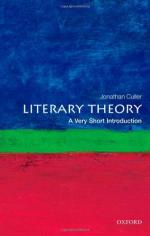
|
| Name: _________________________ | Period: ___________________ |
This test consists of 5 multiple choice questions, 5 short answer questions, and 10 short essay questions.
Multiple Choice Questions
1. What idea did Rousseau help to develop?
(a) Evolution.
(b) Individuality.
(c) Financial awareness.
(d) The benefits of marriage.
2. By creating a vague story or lead character In literature, Culler suggests that the author hopes to achieve what response from the reader?
(a) Creativity.
(b) All of these.
(c) Projection.
(d) Frustration.
3. According to Chapter 2, which of the examples below cannot be considered literature?
(a) Instructional manuals.
(b) All of these.
(c) The phone book.
(d) Private journals.
4. In "The History of Sexuality," what was used as a blanket term to describe all aspects related to sexuality?
(a) Procreation.
(b) Imagination.
(c) Evolution.
(d) Sex.
5. In the West, most theorists believe language allows for _____________.
(a) Brotherhood.
(b) Thought expression.
(c) Communication.
(d) Intimacy.
Short Answer Questions
1. According to Culler, what do the authors of classical literature often hide within their words?
2. In English literature, many lead characters were written in order to inspire ______________.
3. What theory believes that language limits the ability to think?
4. Literature as an aesthetic object attempts to encourage the reader to explore a relationship between _____________.
5. Who believed that linguists have the ability to help others speak, read, and understand never seen before words and sentence structures?
Short Essay Questions
1. What do theorists mean when they say that a reader is limited by his "horizon of expectations"?
2. What does literary theory work to uncover, according to Chapter 1?
3. According to Culler, what do most literary works resemble?
4. Why does Culler believe that Shakespeare has remained widely read and discussed while other writers from that time period have not?
5. Based on Chapter 1, what is the purpose of the critique that often comes from literary theory?
6. According to the Sapir-Whorf hypothesis, what does language determine?
7. According to Noam Chomsky, linguists help raise the quality of language for what purpose?
8. Modern Western literature can be traced back to what group and when?
9. According to Chapter 2, why was it significant that many works of English literature allowed the low class worker to surpass the aristocrat?
10. According to Chapter 4, what does "reader-response" criticism depend upon?
|
This section contains 599 words (approx. 2 pages at 300 words per page) |

|




